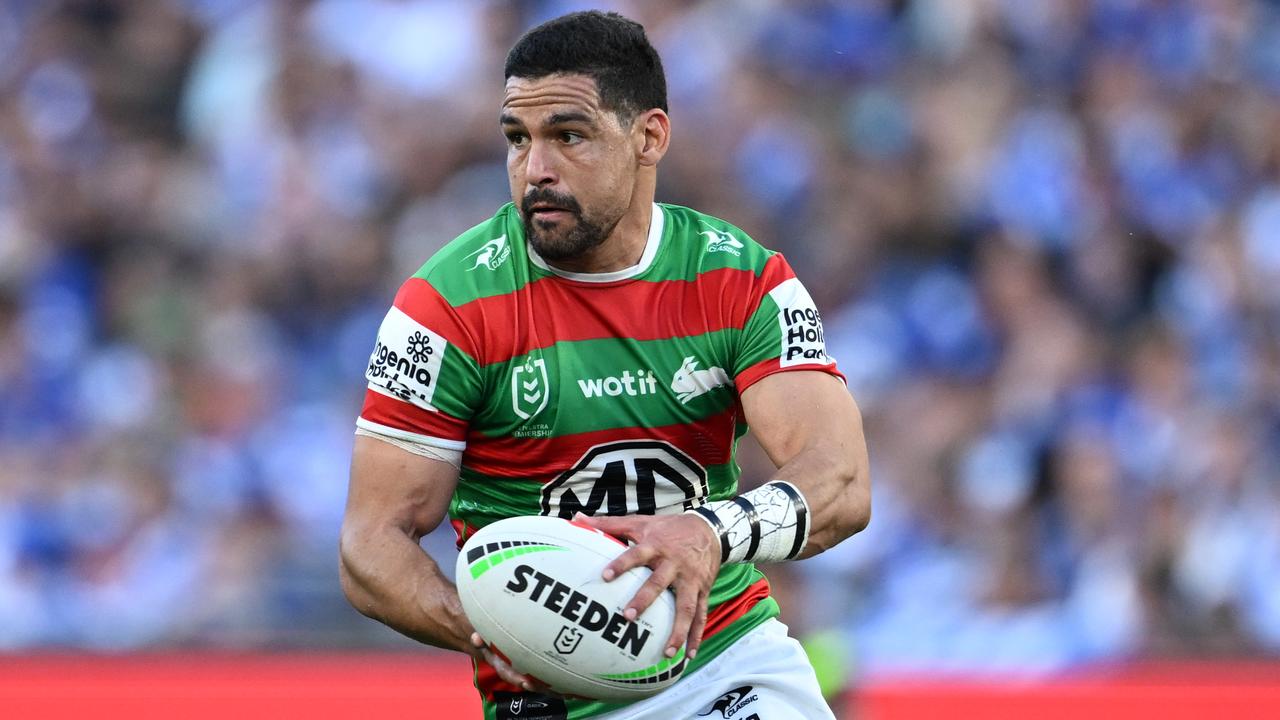Paul Kent: Wayne Bennett’s proven formula for success
The big difference between the haves and have-nots in the NRL is more to do with coaching talent than playing talent, writes PAUL KENT.
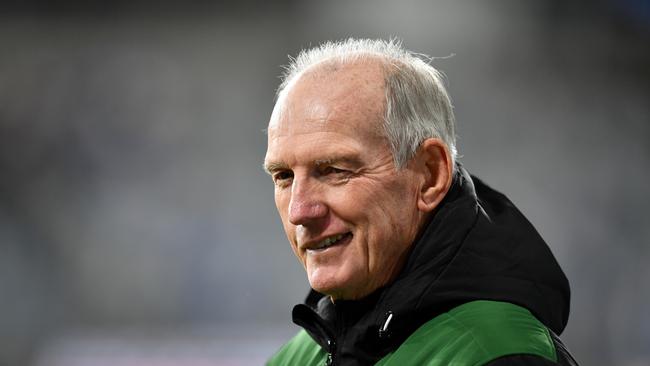
NRL
Don't miss out on the headlines from NRL. Followed categories will be added to My News.
The evidence is everywhere, it goes, that as the NRL prepares to announce a 17th franchise, there are simply not enough quality players to go around.
Look at all the blowouts this season, for heaven’s sake. Or the inability of those bottom-placed teams to shake the anchor loose.
How can the competition stand another team, diluting talent, if there’s not enough quality players to spread across the 16 teams already available?
Watch every 2021 NRL Telstra Finals Series match before Grand Final. Live & Ad-Break Free on Kayo. New to Kayo? Try 14-days free >
Where this supposed evidence was not, though, was at a warm field in far north Queensland Friday night when Manly and the Sydney Roosters duked it out in a semi-final that disproved all this expansion worry, although it might have shone light on a deeper problem.
Maybe the thing is not that there are not enough good-quality players to fill the 17 teams, but that there are not enough good-quality coaches.
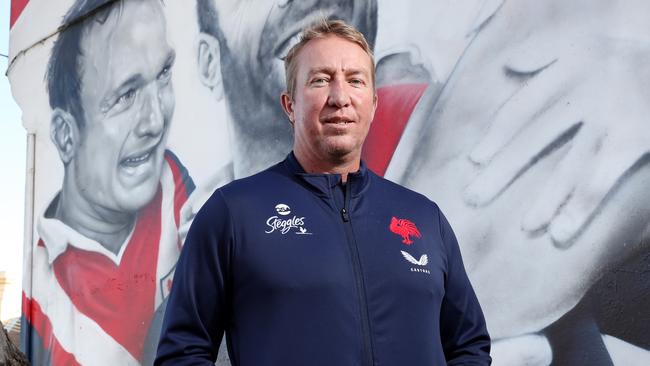
It seems the more sensible argument.
Roosters coach Trent Robinson put together a team on Friday night with the help of paperclips and rubber bands, one that had no right to be contesting a semi-final.
Into the team were the likes of Egan Butcher (14 games), Fletcher Baker (15 games), Sam Walker (20 games), Matt Ikuvalu (37 games) and Drew Hutchison (32 games). Four of the Roosters starting backline had less than 40 starts.
Ben Marschke is on a development contract and rose several levels in grade this season to play hooker in his 13th game for the Roosters last night. Marschke is the fourth-string hooker.
The Roosters are becoming famous for their Next Man Up philosophy, the extraordinary ability when they lose quality players to replace them with lesser lights who somehow turn up and do the job – one they have been doing for weeks.
And each unlikely victory came with the postscript that, at some point as they head deeper into the season, the Roosters will reach their tipping point and be unable to match it with the best. Yet they kept on winning.
Their gritty durability is possible only because of the first-class coaching they have received, each new player coming in with a solid understanding of what he was required to do once in the top grade.
Robinson is one of the great teachers in the NRL, underlined this season by a coaching effort that saw him achieve what is perhaps the best indicator of what a good coach looks like: he took fringe squad players and turned them into performing starters.
There is improvement in all of them.
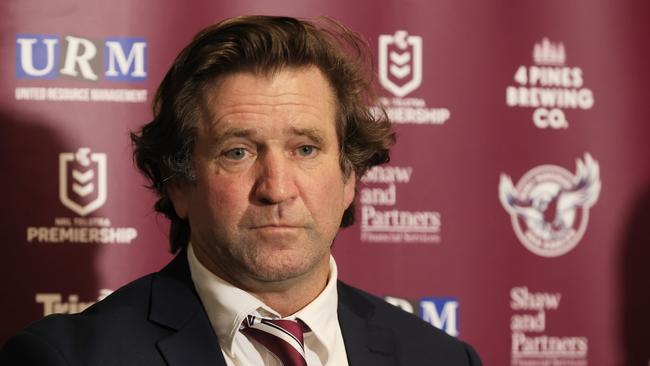
Compare this with some of those who hovered around the bottom of the ladder this season who were unable to even turn their recognised starters into quality performers, and whose teams have shown no improvement over the season just gone.
A similar job was done on the flip side with Des Hasler.
Hasler blooded several rookies and reinvented a few veterans to turn the Sea Eagles’ season around after they began the season letting in 40-odd points a game.
Hasler is intense and unconventional but there is a purpose to his Nutty Professor routine, which promotes buy-in from his players.
Just a few weeks back, Kieran Foran was explaining his rejuvenation was all down to the coaching Hasler put into him.
Foran said he was a player who liked to be told exactly what to do on the field and Hasler was providing him exactly that. Other coaches he has had were too broad in their instructions, content to tell him to just go out and play.
Foran likes clear instructions, which suits Hasler perfectly because when it comes to coaching he micromanages it all.
As far as you look the difference between the haves and have-nots in the NRL is more to do with coaching talent than playing talent.
Nobody is sure why.
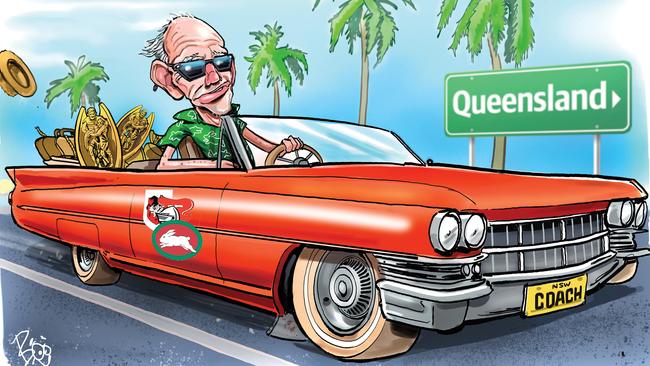
A theory is the modern route coaches take to their NRL job, preferring to come in at the lower reaches of an NRL club, taking an assistants role, rather than risking being out of sight by coaching in State leagues or somewhere else, where they would have head coaching responsibilities.
It means less and less coaches are having actual experience as a head coach at any level in the game and a whole area of their education is not being nourished.
While assistants do a lot of the actual on-field coaching at NRL clubs, their background is all the Xs and Os, the countless hours spent watching video and planning strategy.
Very little is done in the way of man management, which is usually where the rookie coaches fall over. The secret is coaching.
With a magician’s talent for misdirection, Bennett has turned the Rabbitohs into proper contenders without too many noticing at all.
Since their flogging to Penrith in Dubbo halfway through the season, the Rabbitohs have steadily reinforced their defence while continuing to lacerate their opposition’s right edge defence.
Bennett is no Xs and Os coach.
He has never engaged in the battle for “Footy IQ” that some coaches hold so dear, a competition that exists in only their own minds.
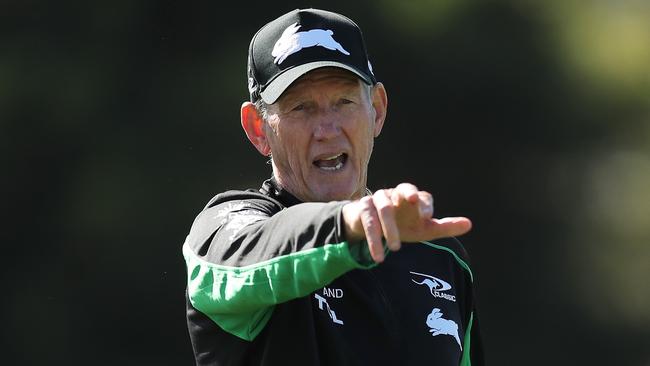
The rest measure coaches by premierships.
Instead, Bennett slowly works on his three key criteria that has held him throughout: they must be fit, they must be able to defend, and they must want to play for each other.
This last area is lost on many of the new coaches, still dissecting video. But it is often the key to improvement.
And so as the season draws close, the Dally M Coach of the Year gets named in just over a week and each new day brings whispers it appears Redcliffe will emerge as the 17th NRL franchise.
When the three expansion hopefuls met with the ARL Commission last month, the Brisbane Jets and Brisbane Firehawks offered Bennett as their preferred coach.
Redcliffe failed to nominate but it was believed Paul Green was their preferred option.
Since then, the Dolphins have emerged as the team most likely and manoeuvred Bennett into the key slot for coach.
Whether this was their own doing or a recommendation from the NRL, who understand the greater interest a Bennett appointment will create in Brisbane, is unknown.
What’s important, though, is that he will deliver fundamental coaching that will fast-track the foundations at the new club quicker than anything else.
It makes sense.
SHORT SHOT
Maybe the NRL should start streaming judiciary hearings.
Fan frustration at the match-review panel reached new levels this week when Sam Verrills was, first, charged and then unsuccessful in having his grade two charge reduced to a grade one. Roosters fans were filthy.
Having watched plenty of judiciary hearings over the years, what fans don’t fully grasp is how well, or how poorly some cases are presented, and the difference between the two can be staggering.
The idea of having three former players on the panel to judge their peers is also flawed.
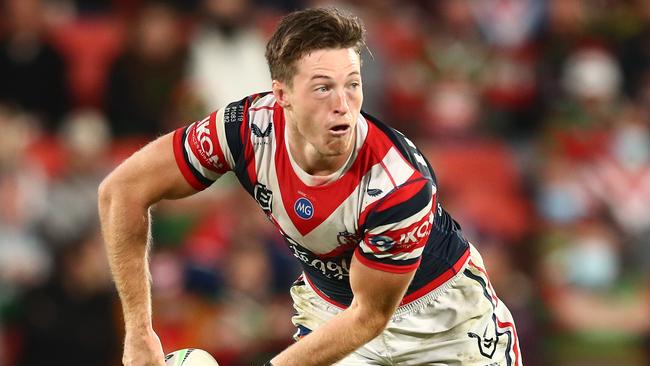
With both sides often presenting heavy legal argument, more than once I have seen a panel member glaze over in the eyes and been unable to follow the line of reasoning a particular side is presenting — thereby defeating the purpose of having former players there to adjudicate.
The smart legal minds know they can befuddle the panel and often try to do so to achieve their desired outcome.
Including somebody who actually understands the rules the player is charged with, and what the rule is intended to achieve, would also be a good start.
Four words that prove we are living in Wayne’s world
The kick from Nathan Cleary’s foot was one of those high, familiar floaters and the impact it would have on the game would shake all of them.
Rabbitohs rookie Blake Taaffe moved under the ball and, as usually happens with the floater, the ball drifted on the breeze like it was half-filled with helium until, at the last moment, it moved late and Taaffe lurched forward and dropped it.
The impact on the game was not the kick itself but what happened immediately after Cleary struck the ball when it was still high in the air.
“Matt! Matt!” referee Gerard Sutton said. “Don’t change your line.”
Penrith backrower Matt Eisenhuth was on the run and looked at Sutton, somewhat confused.
“What? What?” he said.
Sutton replied: “Mate, take a position, don’t move.”
And with that, all the back and forth between Penrith coach Ivan Cleary and Souths coach Wayne Bennett was suddenly real. In a moment, all the talk of the previous 24 hours became valid.
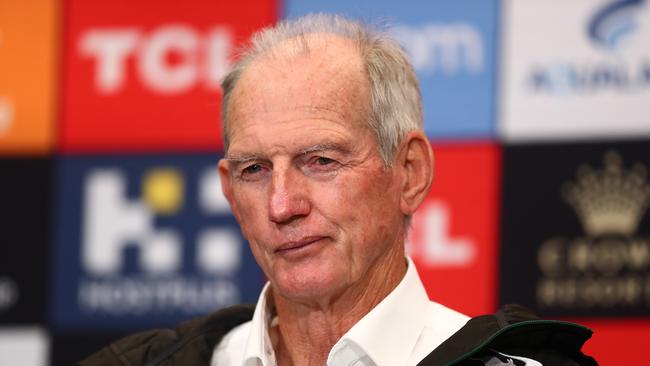
Any suggestion that the pre-game talk was as innocent as one old coach simply schooling a not-so-old coach on the Art of Distraction in the lead-up to a big game was buried right there in Sutton’s comments to Eisenhuth.
How much of it was planned remains the hot topic today, and for several days to come.
Predictably, some have hinted at vast conspiracy theories, suggesting Cleary leaked the information to a media ally in the hope of protecting Nathan’s kicking game, and pressuring the referee to allow his blockers to remain in place, in what would be a double sting.
Such mind games are not uncommon among the coaching ranks but have rarely, if ever, been part of Cleary’s armoury.
The most likely solution is that Bennett’s complaint to the NRL after round 23, in which he was critical of Penrith using illegal blockers to protect Nathan Cleary’s kicking game, was leaked from within the NRL and Cleary was sought for comment and naively fell into it, although it was not portrayed that way.
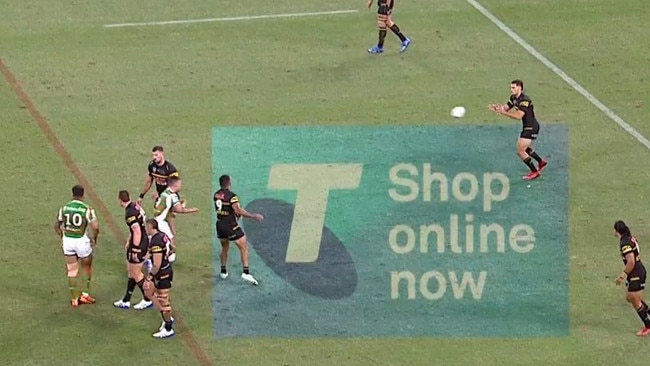
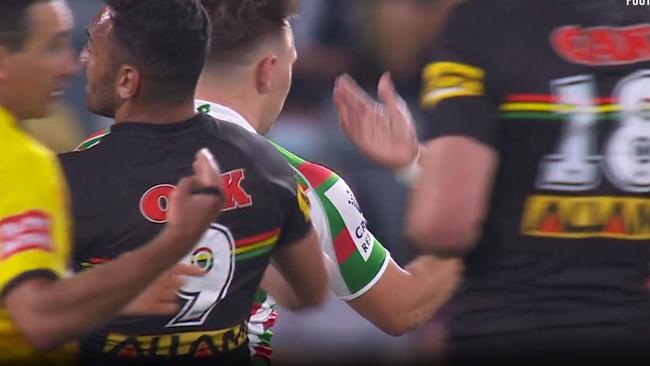
The impact on his team was damaging.
The confusion in the Panthers players from that first kick stayed with them for the rest of the game.
Was the referee cracking down on them? How much protection could they continue giving Cleary if the referee was already warning them after the first proper kick in the game?
When it gets this late in the season, and the margins between teams is increasingly minimal, it sometimes does not take much to knock a team from its rhythm.
“Our boys were being spoken to about stuff on the run that we never get done for, so I’d suggest that type of thing has an influence,” Ivan Cleary said after the game.
The NRL’s head of football Graham Annesley, a former referee himself, was not sure the pre-match slanging match between Cleary and Bennett had any certain effect.
Annesley said referees did not go into a game with preconceived ideas on how they would adjudicate.
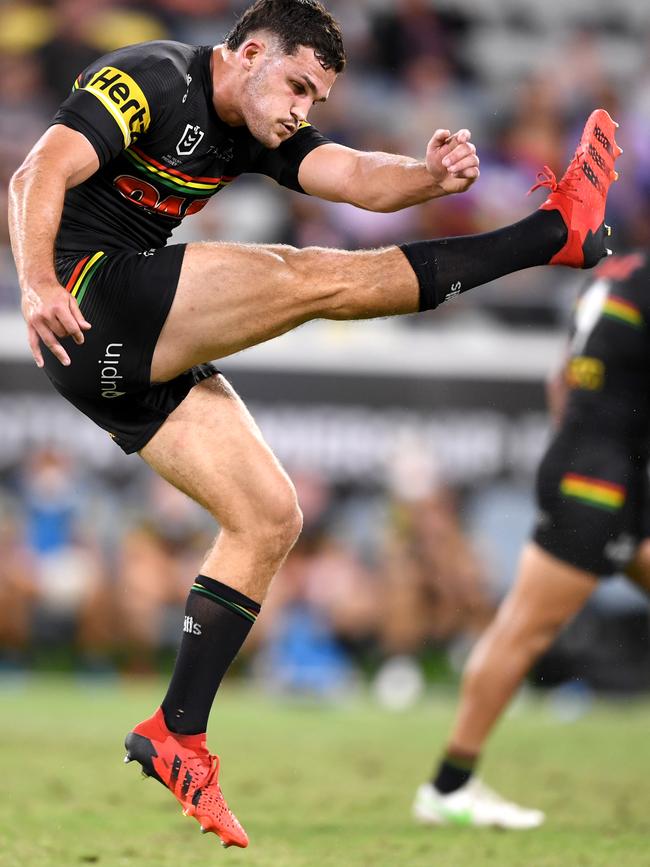
“Referees just see incidents and react to them,” he said Monday.
“The reactions are instinctive and they make a decision on it.
“Whether that is influencing them subliminally or not, we will never know.
“I don’t think it has any overt influence over how they referee the game. Whether there is something in the back of their mind, I don’t know.”
Maybe …
Sutton’s comments to Eisenhuth, when aligned with Cleary’s post-match comments, would suggest a subliminal influence, at least, was being exerted.
And the fact is, coaches complain to the NRL every week, some more regularly than others.
And they do it because they believe it works. Bennett and Cleary are at the lower end of complainants.
As the night wore on, Nathan Cleary, perhaps because he was no longer as well protected, perhaps not, reverted to more traditional end-over-end bombs which take less to set up, so can be fired quicker, but are not as nearly difficult to defuse.
It was evidence the Panthers had unravelled.
To show how riddled with conspiracy theories the NRL can be, there is also a belief around the game that it was Bennett who leaked his own complaint, to then force Cleary to react.
For those preaching at the House of Wayne, who believe in this theory, the logic follows an old Bennett rule that says if your players are at risk of being distracted, then make yourself the distraction.
So with the Rabbitohs entering the game without Latrell Mitchell, and supposedly unable to win without him, and having not beaten Penrith in their previous five games, and questions sure to come up about that, it goes that Bennett found a way to make himself the conversation instead of his team.
It seems a mighty stretch, but Bennett supporters remain firm believers.
What is a fact is that, with a subtle shift, the pre-game attention did quickly shift to Penrith’s kicking game and not the limitations of South Sydney.
And say what you will but, after Sutton’s early warning, it was the last ball Taaffe dropped.
Smart people making bad decisions
The carrier pigeons brought news midweek that the Queensland Rugby League had reached a stalemate with coach Paul Green and both sides had amicably agreed to part ways, or so claimed the statements.
It immediately set off uncertain times for the Maroons.
Not so much because the partnership between the QRL and the head coach was over but more because they could not agree on a way forward, forcing the separation and pushing the Maroons into cloudy territory.
The decision and the mixed messaging around it have meant the question has arisen, at least in one small corner of the world, of whether the QRL is making the classic mistake often seen in the game nowadays of getting too far ahead of itself.
There is an assumption that success is linear in the NRL, that the natural order is each new season brings improvement, as does each succeeding appointment.
It ain’t necessarily so, though, and as a warning it should hang in the boardroom of every football operation in the country.
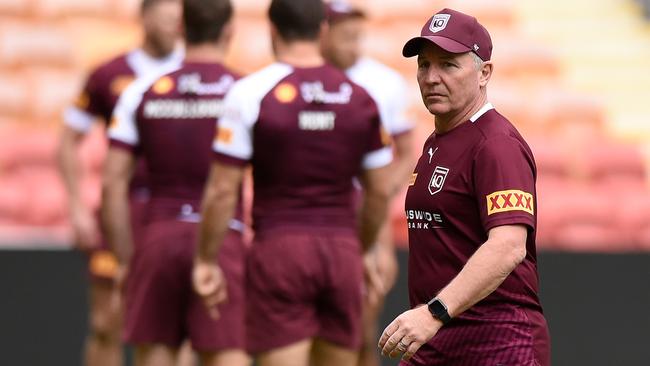
The Blues lost their way 15 years ago when Ricky Stuart stepped down as Blues coach to take the Australian job after NSW’s third series win in a row, a time many might remember, as some folks got to questioning the future of Origin itself.
Into the breach stepped Graham Murray, a tremendous NRL club coach but a man with no real experience in rep football who went on to prove it.
At the same time, in stepped Mal Meninga for Queensland, who was the opposite.
Beaten in that first game, Meninga leaned heavily on what he knew, Origin mythology, to get his Maroons up for the fight and somehow went on to take the series while Murray, a pure coach, let much of the Origin mythology slip away, preferring to coach the Blues more like an NRL side.
Unfortunately they played like it.
On the back of that simple difference, the Maroons set off on an unprecedented winning streak, taking eight series in a row and with 11 wins in the next 12 series. But it was helped in part by a NSW system that completely lost its way.
The Blues kept losing, and could never quite figure out why. They made changes after losses and were criticised for not staying loyal, like Queensland would. So they stayed loyal to the losing players and, who could ever guess, kept losing.
Lost along the way was the root of rugby league’s great problem: that there were people who knew what they knew and too many who didn’t know what they didn’t know.
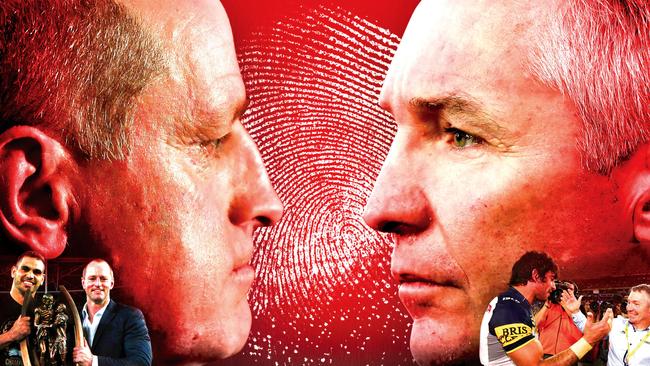
This latter group has been feeding in fertile soil in the NRL for far too long, and it is rife through clubland.
Where this all began nobody knows, but it picked up when the NRL went through its “intellectual revolution” when the Commission-era began in 2012 and a whole lot of Big Business Brains stormed the boardrooms promising to smarten everyone up.
Rugby league’s achilles heel at the time was its lack of education, so nobody stood up to defend themselves. Too many good people let too many non-football people, with stars in their eyes, begin to make big decisions at their clubs.
They told everybody the game needed more business nous and so a whole lot of football intellect got moved on while smart business people with absolutely no understanding of rugby league pushed into their place.
What the game soon found out was that these people performed no better, and often worse. They had little industry knowledge, which was equally fatal, and so with that understanding the smart clubs have moved towards the model of appointing people who know the business of football.
But the thinking hangs over. Is the QRL making the same mistake?
In a bid to find the next level, are the Maroons stepping too far away from what works?
The contradictions since Green left the job are concerning. The QRL wanted a long-term coach but rejected Green’s approach to implement long-term plans.
Newly elected QRL board member Cooper Cronk said on NRL360 on Wednesday the job was a prestigious role and needed to be treated as such. It shouldn’t be treated as a consolation prize for those preferring to coach in the NRL.
Green took umbrage at that, left to wonder if the position was so prestigious, why wasn’t it paid as such.
Green was paid less than $200,000 to coach the Maroons this season, considerably less than what every NRL coach is paid.
If the role was so prestigious, and had genuine long-term prospects, why not reflect that?
The QRL looks set to make Billy Slater the new coach, and on the surface it looks a solid appointment.
Slater was a champion player whose footy intellect sat firmly on the top shelf.
Yet the game is littered with champion players who failed as a coach. Coaching has never been more specialised than it is now and, as every newly promoted coach will tell you, there is a big difference between the pure coaching that comes in the assistant’s role and that of being the head coach.
And Origin brings with it a whole lot of pressure and obligation.
The Maroons have to be pitch perfect with their next appointment.
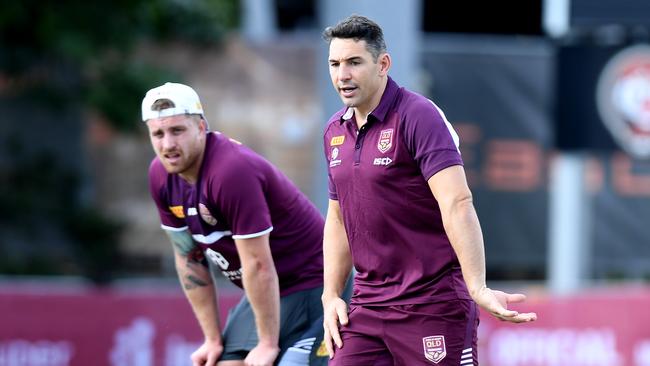
While Wayne Bennett has emerged as an option for some, given he is unemployed next season, he is unavailable for the same reason Green was not preferable; he wants to coach the 17th franchise when it is finally announced.
Slater’s credentials are the same as Meninga’s were, which suggests why he will be appointed: a former Origin legend saturated in Origin mythology.
It worked for Meninga – enough for Queensland to on Friday suggest the idea of him helping form a coaching dream team with Slater – but not for Kevin Walters.
The same as, in NSW, it worked for Brad Fittler but not for Laurie Daley.
The difference is Meninga had a champion team, which Walters did not, and Fittler has a champion team, which Daley did not.
Only true coaches, like Bennett last year, could overcome it.
Nothing sets an organisation back quicker than a bad appointment as coach. They are the most important role in any organisation. The evidence is everywhere you look.
The Wests Tigers, for example, are going through a similar crisis of understanding.

What does success look like? And how do we build it? They keep changing the club, which means they keep changing everything else within the club and don’t stick to any plan long enough to see it through.
The greatest irony is that there is nobody at the club, outside the man under the most pressure – coach Michael Maguire – who knows what a premiership-winning club looks like.
Yet as the current review is being done, he is the one with the least chance of survival.
The only positive for the Tigers when it comes to reminding their way is that former premiership-winning coach Tim Sheens has been recruited to return to Australia and run the football program, but what that means for Maguire could be irrelevant.
Coaches drive the personality of their teams. The danger for those who employ them is that once the coach’s identity begins to fade, the team often follows.
SHORT SHOT
That Racing Victoria officials briefly considered banning jockey Jamie Kah from attending Sunday night’s Victorian Racing Awards, where she is a heavy favourite to pick up the Scobie Breasley Medal, was a small disgrace.
Kah was one of several jockeys busted breaking Covid restrictions in the Airbnb scandal at Mornington last month and for that she received a three-month ban, which takes her out of all the rich Spring races, and was a penalty towards the severe end.
She copped the penalty and moved on. In the first weekend of her ban, she lost $40,000 in riding fees and winning percentages for horses she had been booked to ride.
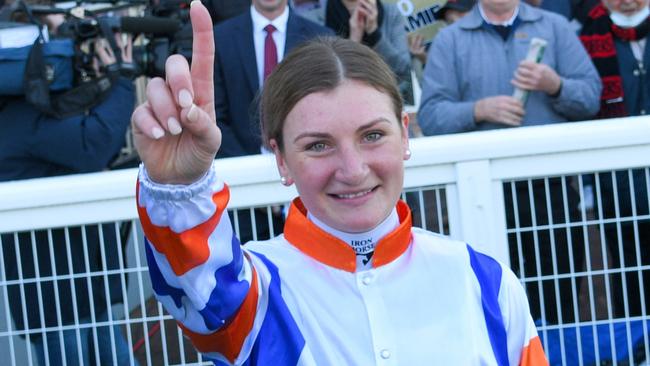
To then double down and suggest Kah should be banned from attending the awards ceremony, effectively doubling-down on the punishment, stunk of old men out of touch with reality.
Kah last season became the first jockey in history to ride more than 100 winners in a season in Victoria.
The list of champion riders who could never reach that milestone would fill a Melbourne Cup, and then some, but Kah remains the lone jockey to have achieved it. She deserves to be recognised for that.
Thankfully sanity has prevailed and after several days of deliberation – can you believe it took that long? – Kah will attend, but not until after Racing Victoria put her under unnecessary duress before making their call.
Kah is the best jockey in Australia at the moment. She made a mistake and got punished.
She didn’t need to be punished twice.
More Coverage
Originally published as Paul Kent: Wayne Bennett’s proven formula for success





